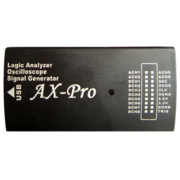Difference between revisions of "ARMFLY AX-Pro"
m |
|||
| (19 intermediate revisions by 6 users not shown) | |||
| Line 1: | Line 1: | ||
[[File:AX-Pro. | {{Infobox logic analyzer | ||
| image = [[File:Armfly_ax_pro.png|180px]] | |||
| name = ARMFLY AX-Pro | |||
| status = supported | |||
| source_code_dir = fx2lafw | |||
| channels = 8 + 1 | |||
| samplerate = 8ch @ 24MHz, 8+1ch @ 12MHz | |||
| samplerate_state = — | |||
| triggers = none (SW-only) | |||
| voltages = Digital: 0V — +5V<br/>Analog: ±10V (±20V max) | |||
| threshold = Fixed: V<sub>IH</sub>=1.4V, V<sub>IL</sub>=0.8V | |||
| memory = none | |||
| compression = none | |||
| price = $35-45 | |||
| website = [http://www.armfly.com/product/AX-Pro/ax-pro.htm armfly.com] | |||
}} | |||
The '''ARMFLY AX-Pro''' is a USB-based, 8-channel logic analyzer with up to 24MHz sampling rate, with 1 additional analog channel (theoretically 2, but only one of them can be used at a time; 3MHz analog bandwidth). Has been proven to be possible to work at 24MS/s also for the Analog channel even if the ADC max sample rate is 20MS/s (see resources). | |||
It is a clone of the [[CWAV USBee AX-Pro]]. There is an "[http://item.taobao.com/item.htm?id=12503749579 RS232 RS485 RS422 CAN converter]" add-on board which also has a BNC connector for analog support. | |||
In sigrok, we use the open-source [[fx2lafw]] firmware for this logic analyzer. | |||
'''Note''': [[fx2lafw]] currently doesn't support switching between the two possible analog channels, ACH1 will be used unconditionally. | |||
See [[ARMFLY AX-Pro/Info]] for some more details (such as '''lsusb -v''' output) on the device. | |||
== Hardware == | == Hardware == | ||
* Cypress CY7C68013A-56LTXC ( | * '''Main chip''': Cypress CY7C68013A-56LTXC (FX2LP) | ||
* '''I2C EEPROM''': Atmel ATML920 24C02N SU27 D | |||
* '''Low-dropout voltage regulator''': Advanced Monolithic Systems AMS1117-3.3 | |||
* '''Crystal''': 24MHz | |||
* '''ADC''': Texas Instrument TLC5510IPW, 8-Bit, 20 MS/s ADC Single Channel | |||
* '''OpAmp''': Texas Instrument LMV358 Dual Low-Voltage Rail-to-Rail Output Operational Amplifier | |||
* '''OpAmp''': Analog Devices AD8065 (SMD marking "HRA") | |||
* '''Multiplexor''': (I do not see it. Is it U5?) | |||
* '''Edge-Triggered D-Type Flip-Flops"": HC574 (U15) | |||
* ... | |||
== | == Photos == | ||
<gallery> | <gallery> | ||
File:AX-Pro.JPG|<small> AX-Pro </small> | File:AX-Pro.JPG|<small>AX-Pro</small> | ||
File:AX-Pro-Cables.JPG|<small>Cables</small> | File:AX-Pro-Cables.JPG|<small>Cables</small> | ||
File:AX-Pro-PCB.JPG|<small>PCB front</small> | File:AX-Pro-PCB.JPG|<small>PCB, front</small> | ||
</gallery> | </gallery> | ||
== Protocol == | |||
Since we use the open-source [[fx2lafw]] firmware for this device, we don't need to know the protocol. | |||
== Hardware configuration (V.5) == | |||
* PA0 -> Select the Analog Source (Channel 1 or 2) | |||
* PA1-7 are not connected | |||
* CTL0 -> not connected | |||
* CTL1 (connected with RDY1) -> CLK Pin (external) | |||
* CTL2 -> provide the clock to the ADC | |||
* PORTB -> Digital Data (8 pins, external) | |||
* PORTD -> ADC Data | |||
== Resources == | == Resources == | ||
* [ | |||
* [https://item.taobao.com/item.htm?spm=a230r.1.14.24.3c1ad073DBcRDL&id=19741672514&ns=1&abbucket=8#detail ARMFLY Taobao shop] ([http://translate.google.com/translate?hl=en&sl=zh-CN&tl=en&u=https%3A%2F%2Fitem.taobao.com%2Fitem.htm%3Fspm%3Da230r.1.14.24.3c1ad073DBcRDL%26id%3D19741672514%26ns%3D1%26abbucket%3D8%23detail&sandbox=1 English translation]) | |||
* [http://item.taobao.com/item.htm?id=12503749579 | * [http://item.taobao.com/item.htm?id=12503749579 ARMFLY AX-Pro RS232 RS485 RS422 CAN converter] ([http://translate.google.com/translate?hl=en&sl=zh-CN&tl=en&u=http%3A%2F%2Fitem.taobao.com%2Fitem.htm%3Fid%3D12503749579 English translation]) | ||
* [https://www.youtube.com/watch?v=hM8xnfO61Aw ARMFLY AX-Pro Analog Channel up to 24MS/s] | |||
[[Category:Device]] | |||
[[Category:Logic analyzer]] | |||
[[Category:Oscilloscope]] | |||
[[Category:Mixed-signal oscilloscope]] | |||
[[Category:Supported]] | |||
Latest revision as of 13:55, 30 June 2019
 | |
| Status | supported |
|---|---|
| Source code | fx2lafw |
| Channels | 8 + 1 |
| Samplerate | 8ch @ 24MHz, 8+1ch @ 12MHz |
| Samplerate (state) | — |
| Triggers | none (SW-only) |
| Min/max voltage |
Digital: 0V — +5V Analog: ±10V (±20V max) |
| Threshold voltage | Fixed: VIH=1.4V, VIL=0.8V |
| Memory | none |
| Compression | none |
| Price range | $35-45 |
| Website | armfly.com |
The ARMFLY AX-Pro is a USB-based, 8-channel logic analyzer with up to 24MHz sampling rate, with 1 additional analog channel (theoretically 2, but only one of them can be used at a time; 3MHz analog bandwidth). Has been proven to be possible to work at 24MS/s also for the Analog channel even if the ADC max sample rate is 20MS/s (see resources).
It is a clone of the CWAV USBee AX-Pro. There is an "RS232 RS485 RS422 CAN converter" add-on board which also has a BNC connector for analog support.
In sigrok, we use the open-source fx2lafw firmware for this logic analyzer.
Note: fx2lafw currently doesn't support switching between the two possible analog channels, ACH1 will be used unconditionally.
See ARMFLY AX-Pro/Info for some more details (such as lsusb -v output) on the device.
Hardware
- Main chip: Cypress CY7C68013A-56LTXC (FX2LP)
- I2C EEPROM: Atmel ATML920 24C02N SU27 D
- Low-dropout voltage regulator: Advanced Monolithic Systems AMS1117-3.3
- Crystal: 24MHz
- ADC: Texas Instrument TLC5510IPW, 8-Bit, 20 MS/s ADC Single Channel
- OpAmp: Texas Instrument LMV358 Dual Low-Voltage Rail-to-Rail Output Operational Amplifier
- OpAmp: Analog Devices AD8065 (SMD marking "HRA")
- Multiplexor: (I do not see it. Is it U5?)
- Edge-Triggered D-Type Flip-Flops"": HC574 (U15)
- ...
Photos
Protocol
Since we use the open-source fx2lafw firmware for this device, we don't need to know the protocol.
Hardware configuration (V.5)
- PA0 -> Select the Analog Source (Channel 1 or 2)
- PA1-7 are not connected
- CTL0 -> not connected
- CTL1 (connected with RDY1) -> CLK Pin (external)
- CTL2 -> provide the clock to the ADC
- PORTB -> Digital Data (8 pins, external)
- PORTD -> ADC Data


